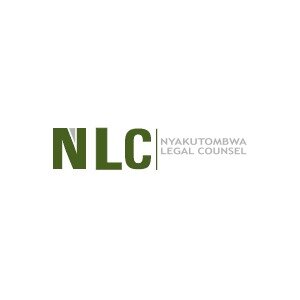Best Investment Lawyers in Zimbabwe
Share your needs with us, get contacted by law firms.
Free. Takes 2 min.
Or refine your search by selecting a city:
List of the best lawyers in Zimbabwe
About Investment Law in Zimbabwe
Investment law in Zimbabwe is primarily governed by several statutes, with the Zimbabwe Investment and Development Agency Act (ZIDA Act) being a key piece of legislation designed to create a conducive environment for domestic and foreign investments. The law aims to promote investment by providing incentives, protections, and a streamlined process for investors. Zimbabwe is rich in natural resources and offers opportunities in various sectors such as mining, agriculture, manufacturing, and tourism, making it an attractive destination for investors. The government's commitment to improving the investment climate is reflected in its efforts to embrace reforms and improve ease of doing business.
Why You May Need a Lawyer
Investing in Zimbabwe, like in any other jurisdiction, involves navigating complex legal landscapes and dealing with various regulatory requirements. Here are some common situations where legal assistance may be beneficial:
- Understanding and complying with the local legislation and regulations relating to specific investments.
- Negotiating and drafting investment agreements or joint ventures.
- Navigating the processes for obtaining necessary permits and licenses.
- Understanding tax obligations and incentives as applicable to investments.
- Resolving disputes related to investment agreements or business operations.
- Ensuring intellectual property rights protection.
- Advising on foreign exchange controls and secure repatriation of profits.
Local Laws Overview
Investment in Zimbabwe is influenced by several key laws and regulations:
- Zimbabwe Investment and Development Agency Act (ZIDA Act): This law establishes the Zimbabwe Investment and Development Agency, which serves as a one-stop-shop for investors. It outlines incentives, rights, and protections for investors.
- Indigenization and Economic Empowerment Act: Initially imposing stringent local ownership requirements, this act has been largely relaxed but still applies to certain sectors.
- Companies and Other Business Entities Act: Governs the formation and regulation of companies, partnerships, and private business corporations.
- Exchange Control Regulations: Control capital movement and foreign exchange transactions, impacting repatriation of profits and dividend payments.
- Environmental Management Act: Important for investors in natural resource sectors, setting requirements for Environmental Impact Assessments (EIAs).
Frequently Asked Questions
1. What is the Zimbabwe Investment and Development Agency (ZIDA)?
ZIDA is the central agency responsible for promoting and facilitating both domestic and foreign investment in Zimbabwe, providing a single point for investors to obtain necessary approvals and clearances.
2. Are there any incentives for foreign investors in Zimbabwe?
Yes, the government offers various incentives including tax breaks, duty exemptions on capital goods, and guarantees against expropriation to attract foreign investment.
3. What is the minimum foreign investment amount required?
While there is no universal minimum investment amount, specific sectors might have requirements based on their nature and scale. Consultation with ZIDA for specific projects is advisable.
4. Can foreigners own land in Zimbabwe?
Foreigners are generally restricted from owning agricultural land but may lease land for agricultural purposes. Ownership of urban land is allowed under certain conditions.
5. What sectors are open for foreign investment?
Many sectors, including mining, agriculture, tourism, and manufacturing, are open for foreign investment. However, some sectors such as the diamond mining industry have additional local participation requirements.
6. Are there restrictions on repatriating profits?
Yes, repatriation is subject to Exchange Control Regulations, which require the approval of the Reserve Bank of Zimbabwe. Proper documentation and compliance are essential.
7. How can investors protect their investments?
The ZIDA Act provides for the protection of investments, including guarantees against nationalization and access to legal dispute resolution mechanisms.
8. What is the role of the Reserve Bank of Zimbabwe in investments?
The Reserve Bank oversees the country's financial system, including exchange controls and ensuring financial system stability, which impacts investment flows and transactions.
9. What are the legal requirements for setting up a business entity?
Investors must register their business with the Registrar of Companies, comply with ZIDA requirements, and obtain necessary permits and licenses specific to their industry.
10. How are investment disputes resolved?
Disputes may be resolved through arbitration or through the courts in Zimbabwe. International investors can also seek recourse through bilateral investment treaties which provide for dispute resolution.
Additional Resources
For more information and support on investment in Zimbabwe, consider these resources:
- Zimbabwe Investment and Development Agency (ZIDA): The primary point of contact for investors seeking opportunities in Zimbabwe.
- Reserve Bank of Zimbabwe: Provides guidance on foreign exchange regulations and monetary policy.
- ZimTrade: Assists with market information and export promotion.
- Zimbabwe Revenue Authority (ZIMRA): Offers advice on tax compliance and incentives.
Next Steps
If you need legal assistance in investment, consider the following steps:
- Identify your needs: Outline the specific legal support you require, whether it's compliance, contracts, or dispute resolution.
- Consult a lawyer: Engage a lawyer with expertise in investment law in Zimbabwe to guide you through the process.
- Contact ZIDA: For official guidance and facilitation of your investment plans.
- Research: Stay informed about the latest changes in the legal and regulatory framework affecting investments.
- Prepare documentation: Ensure all necessary documentation is in order to expedite processes and approvals.
Lawzana helps you find the best lawyers and law firms in Zimbabwe through a curated and pre-screened list of qualified legal professionals. Our platform offers rankings and detailed profiles of attorneys and law firms, allowing you to compare based on practice areas, including Investment, experience, and client feedback.
Each profile includes a description of the firm's areas of practice, client reviews, team members and partners, year of establishment, spoken languages, office locations, contact information, social media presence, and any published articles or resources. Most firms on our platform speak English and are experienced in both local and international legal matters.
Get a quote from top-rated law firms in Zimbabwe — quickly, securely, and without unnecessary hassle.
Disclaimer:
The information provided on this page is for general informational purposes only and does not constitute legal advice. While we strive to ensure the accuracy and relevance of the content, legal information may change over time, and interpretations of the law can vary. You should always consult with a qualified legal professional for advice specific to your situation.
We disclaim all liability for actions taken or not taken based on the content of this page. If you believe any information is incorrect or outdated, please contact us, and we will review and update it where appropriate.
Browse investment law firms by city in Zimbabwe
Refine your search by selecting a city.

















